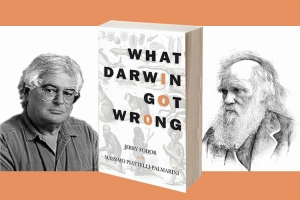Post Author: Bill Pratt
Microbiologist James Shapiro, in his book Evolution: A View from the 21st Century, makes some common sense statements about the controversy over evolution. Remember that Shapiro is no young earth creationist. He is firmly entrenched as an important figure in the world of evolutionary science. Here is what Shapiro says:
General discussions of evolution, especially in the context of the “Intelligent Design” controversy, suffer from an unfortunate conflation in the minds of the lay public (and also of scientists) of three distinct questions:
• The origin of life
• The evidentiary basis for an evolutionary process
• The nature of evolutionary change
Almost universally, the term Darwinism is assumed to be synonymous with a scientific approach that has provided satisfactory answers to all three questions. It is to be hoped that, by now, you realize that these three questions are individually complex and that two of them are quite far from having coherent scientific explanations.
We have little solid science on the origin of life, in large part because there is virtually no physical record, but also because we still have gaps in our understanding of what constitute the fundamental principles of life.
As to the actual nature of evolutionary change processes, you have seen in Parts II and III [of his book] that cytogenetic observations, laboratory experiments, and, above all, molecular evidence about genome sequence changes tell us that the simplifying assumptions made in the 19th and early 20th Centuries are plainly wrong. They fail to account for the variety of cellular and genomic events we now know to have occurred. It should be emphasized that many change events have been quite rapid and have involved the whole genome—notably, symbiosis, interspecific hybridization, and whole genome doubling.
Shapiro goes on to say that he does believe that the second question has been answered.
The one issue that has effectively been settled in a convincing way is the evidence for a process of evolutionary change over the past three billion years. The reason the answer to this question is so solid is that every new technological development in biological investigation—from the earliest days of paleontology through light microscopy and cytogenetics up to our current molecular sequence methodologies—has told the same story: living organisms, past and present, are related to each other, share evolutionary inventions, and have changed dramatically over the history of the Earth.
However, little evidence fits unequivocally with the theory that evolution occurs through the gradual accumulation of “numerous, successive, slight modifications.” On the contrary, clear evidence exists for abrupt events of specific kinds at all levels of genome organization. These sudden changes range from horizontal transfers and the movement of transposable elements through chromosome rearrangements to whole genome duplications and cell fusions.
I can agree with Shapiro, on this last question, to a point. I don’t think we are clear on how all organisms are related, but we certainly understand how some organisms are related. We can also see that life forms have changed dramatically over the history of the earth. I would also agree that the second question is immensely more settled than the first and third questions.
Unfortunately, as Shapiro remarks, scientists tend to conflate all three of these questions as if they are one and the same. I am thankful that a biologist of Shapiro’s stature has attempted to clear up this confusion.

 of cellular biology and genetics over the last 150 years would boggle Charles Darwin’s mind. Some argue that if he were alive today, he would abandon the very theory named after him because of all the contrary evidence that now stands against it.
of cellular biology and genetics over the last 150 years would boggle Charles Darwin’s mind. Some argue that if he were alive today, he would abandon the very theory named after him because of all the contrary evidence that now stands against it.